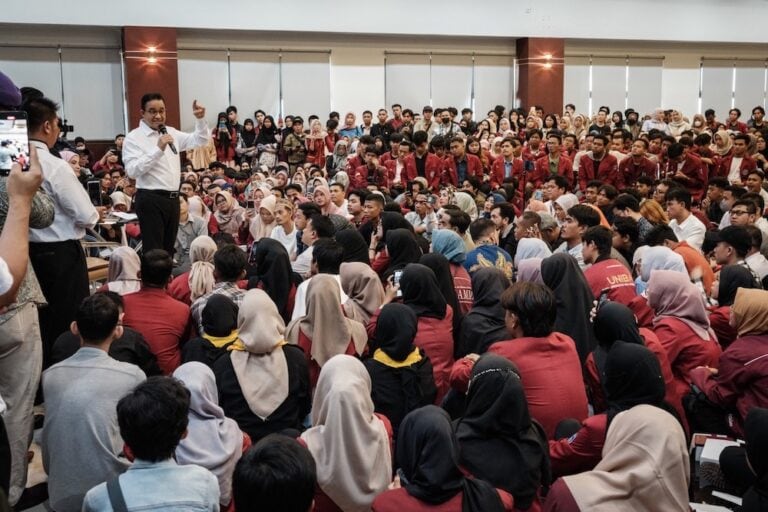(AJI/IFEX) – The following is an AJI press release: THE ALLIANCE OF INDEPENDENT JOURNALISTS (AJI) Commemorating World Press Freedom Day, May 3 On World Press Freedom Day, May 3, which is commemorated by the press community around the globe, the Alliance of Independent Journalists (AJI) expressed concern over the state of press freedom in the […]
(AJI/IFEX) – The following is an AJI press release:
THE ALLIANCE OF INDEPENDENT JOURNALISTS (AJI)
Commemorating World Press Freedom Day, May 3
On World Press Freedom Day, May 3, which is commemorated by the press community around the globe, the Alliance of Independent Journalists (AJI) expressed concern over the state of press freedom in the country, which is a part of the general situation of press freedom in the world.
World Press Freedom Day was introduced by a press freedom seminar held by African journalists, sponsored by UNESCO, on April 29 – May 3, 1991, in the town of Windhoek, Namibia. During the event, the journalists issued a declaration containing the reaffirmation of their support for the U.N. Universal Declaration of Human Rights (Article 19) on the establishment, maintenance and promotion of an independent, pluralistic and free press as an essential requirement for the economic and democratic development of a state.
The Windhoek Declaration defines an independent press as a press independent from governmental, political or economic control or from control of materials and infrastructure essential for the production and dissemination of newspapers, magazines and periodicals. The declaration also calls for a constitutional guarantee for press freedom and the right to associate.
To commemorate World Press Freedom Day on May 3, 2006, the Alliance of Independent Journalists (AJI) called for a commitment by the government of the Republic of Indonesia, at all levels, to guarantee press freedom and journalists’ safety, as well as to ensure that press offences will never again be criminalised. Every act of violence against journalists or media outlets for any reason undermines the public’s right to information and damages the credibility of the government.
Data of the Alliance of Independence Journalists (AJI) shows that 53 cases of violence against journalists and media offices occurred during the period of May 3, 2005 to May 3, 2006. Among them is the murder of a journalist of a local media outlet in East Java on April 29, 2006, currently under police investigation. The cases of violence were ironic because they occurred after the introduction of Press Law Number 40/199 and Constitutional Article 28 F, which provide full protection to the profession of journalist.
On the other hand, AJI expressed strong concern regarding the desire of the Ministry of Communication and Information (Depkominfo) to resume control over the press, an act that will potentially restrict press freedom. This intention has been made clear by various statements on the press made by the Depkominfo minister, as well as by ministry efforts to expand its authority from its communication-information function to the function of media regulator.
In the broadcasting field, Depkominfo has limited the authority of the Indonesian Broadcasting Commission (KPI) and seeks to control the frequency spectrum and to oversee foreign and community radio stations. AJI’s concern increased as a result of the expressed desire of the government to revise Press Law Number 40, of 1999.
Meanwhile, real threats against press freedom reside in the government’s efforts to revise the Penal Code (KUHP), into which the government plans to add various criminal articles against professional workers, including journalists. This is a major setback. KUHP, a legacy of the Dutch colonial rulers, contains only 37 articles which are potentially threatening to the press. The planned revision would increase the threatening articles to 49.
AJI also expressed concern over a number of recent government policies; among them is the priority being given the draft law on Anti-Pornography and Porno-action (APP), which has raised public controversy, while the draft law on Freedom to Public Information (KMIP) has languished. Similarly concerning is the government’s prioritisation in choosing to revise Law No. 13 of 2003, which has sparked anxiety among laborers, over improving the practices of central and regional governments or improving the investment climate in Indonesia.
AJI is also upset to see the powerlessness of the government in dealing with a group of citizens who, under the banner of religious and ethnic symbols, intimidate and enact violence against other groups.
AJI believes that the government sees and hears what we see and hear. Most sincerely, AJI wishes that the government would better defend the interests of the whole community, in the spirit of democracy and in respect of the law and of fundamental human rights. AJI recalls the promises made by the governing party during the 2004 electoral campaigns, to create a safe, just and prosperous Indonesia. AJI feels that the time has come for the government to fulfill its commitment.
AJI is not oblivious to the fact that the Indonesian press has not lived up to the ideal of a free press. During the past three years, the Indonesian Press Council received about 400 complaints from the public regarding news reports, lack of professionalism and ethical violations. This count does not include direct reports made by the public to police, as a result of their lack of awareness of proper procedures under the Right to Respond and the Right to Make Corrections. Therefore, AJI and the press community must continue to stress professionalism and promoting good ethics in journalism.
A free and professional press is required to eradicate corruption and to safeguard the government’s efforts to uphold good governance.
Heru Hendratmoko Abdul Manan
President Secretary General
Jakarta, May 3, 2006


